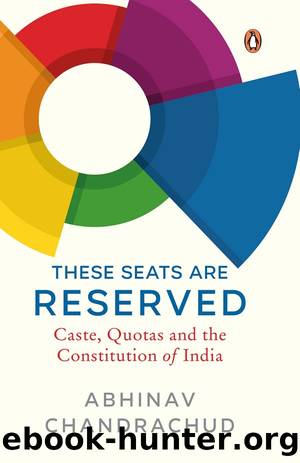These Seats Are Reserved by Abhinav Chandrachud

Author:Abhinav Chandrachud
Language: eng
Format: epub
ISBN: 9789354929151
Publisher: Penguin Group
Published: 2023-01-25T00:00:00+00:00
Gated Communities of Exclusion
In cases concerning reservations, the Supreme Court often had to ask itself whether merit or efficiency would suffer if quotas were allowed to proliferate. Should meritorious candidates not be rewardedâthose who had worked hard and done well in exams or in their performance reviews as employees of the government? By giving a boost to unmeritorious reserved candidates, would reservations not bring the level of colleges and government departments down, the court was asked. In the years since the Indra Sawhney case, several judges of the Supreme Court have come up with some answers to these questions.
For instance, in Ajay Kumar Singh v. State of Bihar,113 the question before the Supreme Court was whether reservation should be permitted in post-graduate medical institutions. The opponents of reservation argued that the level of post-graduate education would be brought down if quotas continued, which would be a disastrous consequence at that level of specialization. However, rejecting this argument, Justice B.P. Jeevan Reddy held that since all candidatesâbelonging to both the general and reserved categoriesâwould eventually have to pass the same exam and be tested on the same standards in order to obtain a post-graduate medical degree, it could not be said that reservations lowered educational standards.114 He also added that academic performance was âno guarantee of efficiency in practiceâ.115 It often happened, he said, that lawyers and doctors who did poorly in academics excelled in their professional careers and vice versa.116
In another case,117 the Supreme Court held that reservations were permissible in both âspecialityâ and âsuper-specialityâ courses. Speaking for the bench, Justice K. Ramaswamy wrote that marks could not be a measure of âhigher proficiency, efficiency or excellenceâ.118 He even added that in internal examinations, marks are awarded by examiners âon the basis of caste, creed, colour, religion etcâ.119
However, these judgements were later overruled by the Supreme Court in Dr Preeti Srivastava v. State of MP.120 The question in that case was whether the government could relax the minimum qualifying marks that backward class students needed in order to get admission into post-graduate medical programmes. The cut-off in the entrance exam in the state of Uttar Pradesh for admission into these courses was 45 per cent for general students and 35 per cent for reserved category students. However, since no reserved category students could be found who had obtained a minimum of 35 per cent in the qualifying exam, the state of Uttar Pradesh reduced the minimum qualifying marks to 20 per cent for reserved category students. The question was whether this was legally permissible.121
Answering that it was not,122 the court held that reservation policies could not be designed in a manner that undermined âother vital public interests or the general good of allâ.123 The court said that it was in the national interest for a large percentage of reservations to be implemented at the primary school level.124 Reasonable reservations, said the court, were also permissible at the university level up to graduation.125 However, at the postgraduate level, considerations apart from âthe individual self-interest of the candidateâ came into play.
Download
This site does not store any files on its server. We only index and link to content provided by other sites. Please contact the content providers to delete copyright contents if any and email us, we'll remove relevant links or contents immediately.
| Anthropology | Archaeology |
| Philosophy | Politics & Government |
| Social Sciences | Sociology |
| Women's Studies |
Nudge - Improving Decisions about Health, Wealth, and Happiness by Thaler Sunstein(7709)
The Fire Next Time by James Baldwin(5447)
iGen by Jean M. Twenge(5417)
Adulting by Kelly Williams Brown(4576)
The Sports Rules Book by Human Kinetics(4388)
The Hacking of the American Mind by Robert H. Lustig(4383)
The Ethical Slut by Janet W. Hardy(4258)
Captivate by Vanessa Van Edwards(3840)
Mummy Knew by Lisa James(3693)
In a Sunburned Country by Bill Bryson(3543)
The Worm at the Core by Sheldon Solomon(3487)
Ants Among Elephants by Sujatha Gidla(3467)
The 48 laws of power by Robert Greene & Joost Elffers(3293)
Suicide: A Study in Sociology by Emile Durkheim(3024)
The Slow Fix: Solve Problems, Work Smarter, and Live Better In a World Addicted to Speed by Carl Honore(3010)
The Tipping Point by Malcolm Gladwell(2927)
Humans of New York by Brandon Stanton(2873)
Get What's Yours for Medicare: Maximize Your Coverage, Minimize Your Costs by Philip Moeller(2742)
Handbook of Forensic Sociology and Psychology by Stephen J. Morewitz & Mark L. Goldstein(2705)
